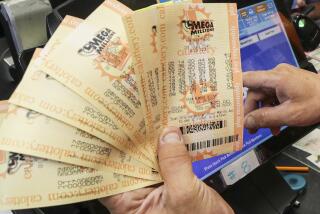Lotto Fever Breaks : Slump: Sales from July to September were $109 million short of the lottery’s goal. Many ex-players say the gamble isn’t fun anymore.
- Share via
Chances are you are reading this article because, like millions of other Californians, your dreams of easy riches were left unfulfilled by last week’s state lottery. The article was written by a reporter who planned on being on the French Riviera, but whose “lucky” numbers failed to beat the 23 - million - to-1 odds of Lotto 6/53.
Lotto Fever, the frenzy of enthusiasm that accompanied the state lottery when it began a scant six years ago, is turning into Lotto Nausea as regular players increasingly forsake the game.
Among the afflicted is Dave Horton, a Burbank claims adjuster, who once played regularly, but recently has been staying away from the game.
“I just get tired of giving them money and never getting anything back,” he said. “You get to the point where you ask, ‘What’s the point?’ ”
Thousands of players are asking themselves the same question. And as sales slump, lottery officials are scratching their heads because fewer people are scratching the tickets and picking the numbers that can turn them into overnight fat cats.
At the beginning of this month, sales since July 1 were $265 million, or $109 million short of the lottery’s goal. The shortfall has caused a brouhaha in Sacramento, where Gov. Pete Wilson has vowed to replace lottery director Chon Gutierrez. Meanwhile, plans to revamp the lottery’s games are on hold until a new director is found.
Valley lottery players say, quite simply, that they just don’t think the game is fun anymore. From liquor stores, convenience markets and news stands, players complained that the odds of winning are too high and the payouts too few and far between.
“Big deal, they’re giving $60 million to one person instead of giving $1 million to 60 people,” groused Andy Culp of Frazier Park as he bought snacks, but no lottery tickets, at a San Fernando liquor store. “They should spread it out and make the payouts a lot more even.”
Behind the gripes of players and the schemes of politicians, experts said, there may be a more obvious and less assignable reason for lackluster lottery sales: the sluggish economy.
“I think the recession has really done a job on the gambler in everyone,” said Mark Goulston, an assistant clinical professor of psychiatry at UCLA. “There is more fear, and sometimes that makes a serious gambler gamble more ferociously. But for the most part, people are trying to hold onto their money.”
Lottery officials agree.
“The lottery is similar to any other product like milk or Pepsi-Cola or Cheetos,” said John Garner, the lottery’s regional manager for Los Angeles and Ventura counties. “It’s an entertainment product and it’s competing for the same discretionary dollar that would go to Disneyland or the bowling alley. In these times, those discretionary dollars become a lot tighter.”
But it is for the chance of instantly rising above the ups and downs of a cyclic economy that players plunk down their cash. They dream of hitting it big like Ralph Laird, a Sherman Oaks accountant who won $27.5 million last year.
Since his win, Laird has continued to play the lottery, missing only one Lotto drawing in the last year. He was playing golf, and didn’t make it to the liquor store in time to buy a ticket.
“I personally continue to play, not because I expect to win again, but because I won once and I think I should support it,” he said, adding, “I think that what’s good about the lottery is that anyone can win. You don’t have to be a Harvard grad or a CPA.”
Most players only seem to half believe Laird, saying they know no one who has won more than a few bucks after spending hundreds on tickets. “You read about the big winners in the paper, but it might as well be in Iraq,” said Tom Gosch, a Granada Hills wine importer who plays only infrequently.
“It’s not the big, big pots that are important,” said Lila Beck of Encino, who plays seven sets of numbers for every drawing, but has yet to recoup her losses. “It’s about people getting excited.”
But for all the complaining about impossible odds and excessive payouts, the lottery’s Garner said, “their actions speak louder than their words.”
It’s when the jackpot soars to amounts beyond comprehension--$40 million, $50 million, even $60 million--that long lines snake away from liquor-store counters and conservative low-rollers plunk down $50 to $100 for their shot at the high life.
That’s just human nature, UCLA’s Goulston said. “There is probably a part of most people that perceive themselves as a long shot,” he said. “There is a part of everyone’s personality that roots for the long shot, that roots for the underdog. Buying the ticket makes you feel a part of that.”
At DeSoto Plaza Liquor in Canoga Park, Jackie Fegette and her husband, Rich, have won about $26,000 playing the Lottery in the past three years. They won $20,000 in the Big Spin, had several $500 Scratcher wins, and Rich won another $3,497. “I just say, ‘I’m gonna win,’ and I win,” Jackie said, explaining her winning strategy.
Aside from a positive attitude, she said, the trick is to buy two tickets and scratch off the coating with a quarter. The first ticket undoubtedly will be a loser, but the second one generally is a winner.
So, in the name of investigative journalism, two tickets were bought and scratched according to Fegette’s instructions.
The first yielded nothing.
Don’t worry, Fegette said, the second one will be a winner.
Scratch. Scratch. Scratch.
Zip.
Next assignment?
More to Read
Go beyond the scoreboard
Get the latest on L.A.'s teams in the daily Sports Report newsletter.
You may occasionally receive promotional content from the Los Angeles Times.










